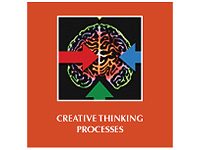Creative Thinking Processes - ADAD9405
Faculty: Faculty of Art & Design
School: School of Art & Design
Course Outline: Download course outline (PDF format)
Campus: Paddington
Career: Postgraduate
Units of Credit: 6
EFTSL: 0.12500 (more info)
Indicative Contact Hours per Week: 3
Equivalent: COFA0214
Excluded: ADAD2405
CSS Contribution Charge: 1 (more info)
Tuition Fee: See Tuition Fee Schedule
Further Information: See Class Timetable
View course information for previous years.
Description
Have you ever had an idea that you wanted to push and develop further, but you weren’t sure how to do it? This fully online course will introduce you to some of the many tools that can facilitate creative thinking. The processes of analysis can help to extend possibilities beyond predictable outcomes, and the same thinking tool can be used across many different disciplines to create new, more integrated and original options.
We will explore visual, verbal and physical ways of transforming ordinary ideas into fantastic ones. Using taught techniques such as the Synectic Pinball Game you will learn to understand more clearly what happens when the creative mind is at work.
We will test the principles of interconnectivity, non-linear (associative) thinking, and use maps, models and metaphors to develop your creative thinking. Famous creative thinkers like Leonardo da Vinci, Dr Edward de Bono, Tony Buzan, Malcolm Gladwell, Nicholas Roukes, George Lucas and Walt Disney used a wide range of processes that we will critically explore.
An important part of understanding and applying the creative process is an examination of how we learn, and how to facilitate the best possible conditions and environments for working in innovative and creative ways. The balance between strategic planning and goal-free approaches to creative processes will be analysed and discussed in relation to the applied research of Professor Teresa Amabile, Stephen Shapiro (24/7 Innovation), Dr Kobus Neethling (Whole Brain Thinking) and Professor Howard Gardner (Multiple Intelligence Theory).
Collaborative theory and practice have at their core the potential to extend and enhance outcomes in multi-disciplinary thinking. Relating to this, the model of Combined Divergence will be introduced, and applied to a project based analysis of the overlaps between critical and creative thinking methodologies.
IMPORTANT NOTE: Students will receive course website location and log in instructions via their UNSW email account prior to the commencement of the course.









